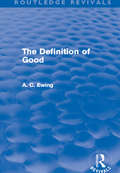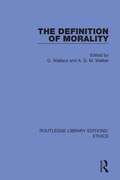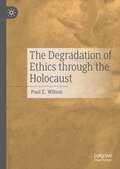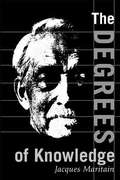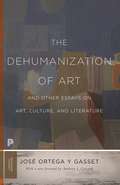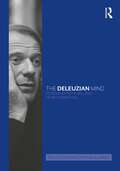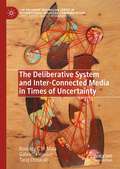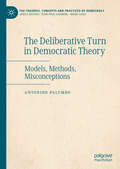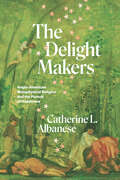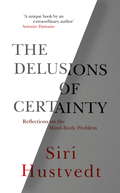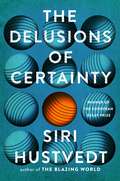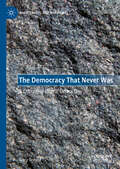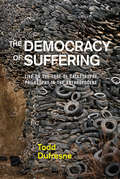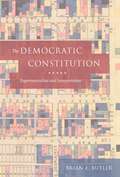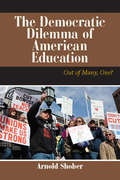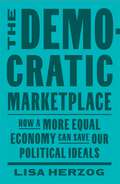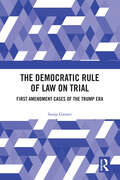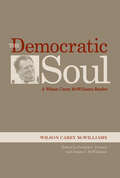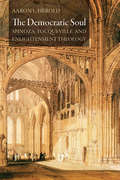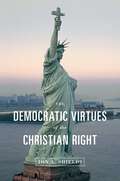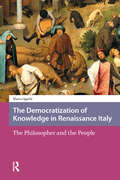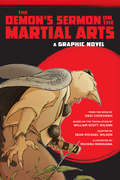- Table View
- List View
The Definition of Good (Routledge Revivals)
by Alfred C EwingFirst published in Great Britain in 1948, this book examines the definition of goodness as being distinct from the question of What things are good? Although less immediately and obviously practical, Dr. Ewing argues that the former question is more fundamental since it raises the issue of whether ethics is explicable wholly in terms of something else, for example, human psychology. Ewing states in his preface that the definition of goodness needs to be confirmed before one decides on the place value is to occupy in our conception of reality or on the ultimate characteristics which make one action right and another wrong. This book discusses these issues.
The Definition of Morality
by G. Wallace A. D. M. WalkerOriginally published in 1970, the papers in this volume discuss the essential and defining characteristics of morality and moral issues and examine how moral views differ from political views, moral beliefs from religious beliefs, and moral judgements from aesthetic judgements. Some of the chapters discuss problems of method and shed light on the complex conditions which any successful definition of morality must satisfy. Taken collectively, these papers reflect he wide variety of approaches adopted by contemporary philosophers.
The Degradation of Ethics Through the Holocaust
by Paul E. WilsonThis book discusses ethical behavior through the genocidal stages of the Holocaust. Paul E. Wilson first looks at the antisemitism in Germany and Europe beginning in the decades preceding the Nazis reign of terror, and goes on to discuss the ethical decisions made in the initial stages that moved society toward genocide. The author maintains that the stages of genocide represent subtle changes that can be happening within a society in response to the moral choices made by actors. By giving attention to the stages of genocide in the Holocaust, this book contributes to the overall understanding of how the Holocaust was possible, and encourages the moral community to join the watch for the development of genocide in the modern world.
The Degrees Of Knowledge (Collected Works of Jacques Maritain Volume #7)
by Ralph Mcinerny Jacques Maritain Gerald B. PhelanThis work is Maritain's masterpiece. Published as Distinguer pour unir, ou Les degres du savoir in 1932, the book proposes a hierarchy of forms of knowledge that culminates in mystical experience and that wisdom which is a gift of the Holy Ghost. His inspiration is St Thomas Aquinas.
The Dehumanization of Art and Other Essays on Art, Culture, and Literature
by José Ortega y GassetA classic work on radical aesthetics by one of the great philosophers of the early twentieth century No work of philosopher and essayist José Ortega y Gasset has been more frequently cited, admired, or criticized than his response to modernism, “The Dehumanization of Art.” The essay, originally published in Spanish in 1925, grappled with the newness of nonrepresentational art and sought to make it more understandable to the public. Many embraced the essay as a manifesto extolling the virtues of vanguard artists and promoting efforts to abandon the realism and the romanticism of the nineteenth century. Others took it as a denunciation of everything that was radical about the avant-garde. This Princeton Classics edition makes this essential work, along with four of Ortega’s other critical essays, available in English. A new foreword by Anthony J. Cascardi considers how Ortega’s philosophy remains relevant and significant in the twenty-first century.
The Deleuzian Mind (Routledge Philosophical Minds)
by Henry Somers-Hall Jeffrey A. BellGilles Deleuze was one of the most influential philosophers of the second half of the twentieth century. As with other French philosophers of his generation, such as Jacques Derrida and Michel Foucault, Deleuze’s work and his collaboration with Félix Guattari has also had huge influence in other disciplines, particularly literature, film studies, architecture, and science and mathematics.The Deleuzian Mind is an outstanding collection that explores the full extent and significance of Deleuze's work, its reception and its legacy. Comprising 38 chapters written by an international and interdisciplinary team of contributors, the volume is divided into eight clear parts: Situating Deleuze A New History of Philosophy. Deleuze’s Precursors Encounters Critical and Clinical The Early Philosophy. A Logic of Sense The Later Philosophy. The Wasp and the Orchid Art and Literature Deleuze, Maths and Science Deleuze and Politics. With its wide-ranging exploration of Deleuze’s thought and the huge influence it continues to have within the theoretical humanities and social sciences, The Deleuzian Mind is invaluable reading for students, researchers and scholars in philosophy, literature, film studies and political theory.
The Deliberative System and Inter-Connected Media in Times of Uncertainty (The Palgrave Macmillan Series in International Political Communication)
by Rousiley C. Maia Gabriella Hauber Tariq ChoucairAdopting a systemic perspective, this book explores media-based communication and reason-giving as a linkage process that transcends time and space. Arguments, reasoning perspectives and emotional concerns link elites’ and citizens’ political judgement within and across a set of interrelated arenas in the political system.
The Deliberative Turn in Democratic Theory: Models, Methods, Misconceptions (The Theories, Concepts and Practices of Democracy)
by Antonino PalumboThirty years of developments in deliberative democracy (DD) have consolidated this subfield of democratic theory. The acquired disciplinary prestige has made theorist and practitioners very confident about the ability of DD to address the legitimacy crisis experienced by liberal democracies at present at both theoretical and practical levels. The book advance a critical analysis of these developments that casts doubts on those certainties -- current theoretical debates are reproposing old methodological divisions, and are afraid to move beyond the minimalist model of democracy advocated by liberal thinkers; democratic experimentation at the micro-level seems to have no impact at the macro-level, and remain sets of isolated experiences. The book indicates that those defects are mainly due to the liberal minimalist frame of reference within which reflection in democratic theory and practice takes place. Consequently, it suggests to move beyond liberal understandings of democracy as a game in need of external rules, and adopt instead a vision of democracy as a self-correcting metagame.
The Delight Makers: Anglo-American Metaphysical Religion and the Pursuit of Happiness
by Catherine L. AlbaneseAn ambitious history of desire in Anglo-American religion across three centuries. The pursuit of happiness weaves disparate strands of Anglo-American religious history together. In The Delight Makers, Catherine L. Albanese unravels a theology of desire tying Jonathan Edwards to Ralph Waldo Emerson to the religiously unaffiliated today. As others emphasize redemptive suffering, this tradition stresses the “metaphysical” connection between natural beauty and spiritual fulfillment. In the earth’s abundance, these thinkers see an expansive God intent on fulfilling human desire through prosperity, health, and sexual freedom. Through careful readings of Cotton Mather, Andrew Jackson Davis, William James, Esther Hicks, and more, Albanese reveals how a theology of delight evolved alongside political overtures to natural law and individual liberty in the United States.
The Delight Makers: Anglo-American Metaphysical Religion and the Pursuit of Happiness
by Catherine L. AlbaneseAn ambitious history of desire in Anglo-American religion across three centuries. The pursuit of happiness weaves disparate strands of Anglo-American religious history together. In The Delight Makers, Catherine L. Albanese unravels a theology of desire tying Jonathan Edwards to Ralph Waldo Emerson to the religiously unaffiliated today. As others emphasize redemptive suffering, this tradition stresses the “metaphysical” connection between natural beauty and spiritual fulfillment. In the earth’s abundance, these thinkers see an expansive God intent on fulfilling human desire through prosperity, health, and sexual freedom. Through careful readings of Cotton Mather, Andrew Jackson Davis, William James, Esther Hicks, and more, Albanese reveals how a theology of delight evolved alongside political overtures to natural law and individual liberty in the United States.
The Delight Makers: Anglo-American Metaphysical Religion and the Pursuit of Happiness
by Catherine L. AlbaneseAn ambitious history of desire in Anglo-American religion across three centuries. The pursuit of happiness weaves disparate strands of Anglo-American religious history together. In The Delight Makers, Catherine L. Albanese unravels a theology of desire tying Jonathan Edwards to Ralph Waldo Emerson to the religiously unaffiliated today. As others emphasize redemptive suffering, this tradition stresses the “metaphysical” connection between natural beauty and spiritual fulfillment. In the earth’s abundance, these thinkers see an expansive God intent on fulfilling human desire through prosperity, health, and sexual freedom. Through careful readings of Cotton Mather, Andrew Jackson Davis, William James, Esther Hicks, and more, Albanese reveals how a theology of delight evolved alongside political overtures to natural law and individual liberty in the United States.
The Delusions of Certainty
by Siri HustvedtPrizewinning novelist, feminist, and scholar Siri Hustvedt turns her brilliant and critical eye toward the metaphysical issues of neuropsychology in this lauded, standalone volume. Originally published in her collection A Woman Looking at Men Looking at Women, The Delusions of Certainty exposes how the age-old, unresolved mind-body problem has shaped - and often distorted and confused - contemporary thought in neuroscience, psychiatry, genetics, artificial intelligence, and evolutionary psychology.
The Delusions of Certainty
by Siri Hustvedt&“The Delusions of Certainty is a unique book by an extraordinary author. Siri Hustvedt is a notable novelist, art scholar, and a philosopher of science. In this memorable and immensely enjoyable volume, Hustvedt rises above the exhausted debate over the two cultures, to demonstrate not just the possibility but also the advantages of combining the approaches of the arts, humanities, and sciences to illuminate a key aspect of the human condition: the mind-body problem.&” —Antonio Damasio, bestselling author of Descartes&’ Error and Self Comes to Mind &“Siri Hustvedt proves her membership in the highest rank of neuroscientists and philosophers who probe the nature of thought and the workings of consciousness. A novelist and a student of psychoanalysis and neuroscience, Hustvedt can ask questions others cannot ask about imagination, identity, epistemology, gendered power, and mortality. Her authoritative knowledge and her courage to challenge the status quo guide the reader to fresh epiphanies about what counts as human nature. The work is, in the end, a work of freedom.&” —Rita Charon, Columbia University &“The Delusions of Certainty is the best book on the mind-body problem I have ever read. Perhaps only a great novelist and essayist can address what neuroscientists and philosophers fail to question. Siri Hustvedt takes the reader on an inspiring journey into highly relevant and often unanswered questions about what it means to be human.&” —Vittorio Gallese, University of Parma Prizewinning novelist, feminist, and scholar Siri Hustvedt turns her brilliant and critical eye toward the metaphysical issues of neuropsychology in this lauded, standalone volume. Originally published in her &“canonical&” (Publishers Weekly) and &“absorbing&” (Kirkus Reviews) collection A Woman Looking at Men Looking at Women, The Delusions of Certainty exposes how the age-old, unresolved mind-body problem has shaped—and often distorted and confused—contemporary thought in neuroscience, psychiatry, genetics, artificial intelligence, and evolutionary psychology.
The Democracy That Never Was: A Critique of Liberal Democracy (Marx, Engels, and Marxisms)
by Gary TeepleLiberal democracy is usually treated as an independent variable, as possessing the absolutes of democratic rule. Its variable forms, changing principles and practice, and conscious destruction by its own advocates, in particular the United States, however, suggest that it is not what it appears to be. This book argues that it is a dependent variable, the political form required by the changing configurations of national capital and their countervailing forces. The forms of liberal democracy have always shifted in concert with the mode of production as their premise. The absolutes of liberal democracy, the author contends, have never been anything but the abstracted principles of the marketplace. Their nature has now become especially visible for what they have been because the premise as national capital development has changed, leaving liberal democracy as a form without its original content, and its present content out of keeping with a national jurisdiction. As a political form, it persists, but its role has been transformed from the regulation of national capital accumulation to the enforcer of the demands of global configurations of capital. It is a role that its citizens implicitly understand, as revealed in widespread political cynicism, decreasing electoral participation, and declining legitimacy that require ever greater measures of deceit from political leaders and increased means of coercive social control, including militarized police forces and pervasive electronic surveillance. There can be no going back to the stage of national politics because the neoliberal content of liberal democratic policies represents the necessities of global capital. And it is the contradictions of global capital that define the character of early 21st century political conflict.
The Democracy of Suffering: Life on the Edge of Catastrophe, Philosophy in the Anthropocene
by Todd DufresneIn The Democracy of Suffering philosopher Todd Dufresne provides a strikingly original exploration of the past, present, and future of this epoch, the Anthropocene, demonstrating how the twin crises of reason and capital have dramatically remade the essential conditions for life itself. Images, cartoons, artworks, and quotes pulled from literary and popular culture supplement this engaging and unorthodox look into where we stand amidst the ravages of climate change and capitalist economics. With humour, passion, and erudition, Dufresne diagnoses a frightening new reality and proposes a way forward, arguing that our serial experiences of catastrophic climate change herald an intellectual and moral awakening – one that lays the groundwork, albeit at the last possible moment, for a future beyond individualism, hate, and greed. That future is unapologetically collective. It begins with a shift in human consciousness, with philosophy in its broadest sense, and extends to a reengagement with our greatest ideals of economic, social, and political justice for all. But this collective future, Dufresne argues, is either now or never. Uncovering how we got into this mess and how, if at all, we get out of it, The Democracy of Suffering is a flicker of light, or perhaps a scream, in the face of human extinction and the end of civilization.
The Democracy of Suffering: Life on the Edge of Catastrophe, Philosophy in the Anthropocene
by Todd DufresneIn The Democracy of Suffering philosopher Todd Dufresne provides a strikingly original exploration of the past, present, and future of this epoch, the Anthropocene, demonstrating how the twin crises of reason and capital have dramatically remade the essential conditions for life itself. Images, cartoons, artworks, and quotes pulled from literary and popular culture supplement this engaging and unorthodox look into where we stand amidst the ravages of climate change and capitalist economics. With humour, passion, and erudition, Dufresne diagnoses a frightening new reality and proposes a way forward, arguing that our serial experiences of catastrophic climate change herald an intellectual and moral awakening - one that lays the groundwork, albeit at the last possible moment, for a future beyond individualism, hate, and greed. That future is unapologetically collective. It begins with a shift in human consciousness, with philosophy in its broadest sense, and extends to a reengagement with our greatest ideals of economic, social, and political justice for all. But this collective future, Dufresne argues, is either now or never. Uncovering how we got into this mess and how, if at all, we get out of it, The Democracy of Suffering is a flicker of light, or perhaps a scream, in the face of human extinction and the end of civilization.
The Democratic Constitution: Experimentalism and Interpretation
by Brian E. ButlerThe Supreme Court is seen today as the ultimate arbiter of the Constitution. Once the Court has spoken, it is the duty of the citizens and their elected officials to abide by its decisions. But the conception of the Supreme Court as the final interpreter of constitutional law took hold only relatively recently. Drawing on the pragmatic ideals characterized by Charles Sanders Peirce, John Dewey, Charles Sabel, and Richard Posner. Brian E. Butler shows how this conception is inherently problematic for a healthy democracy. Butler offers an alternative democratic conception of constitutional law, “democratic experimentalism,” and applies it in a thorough reconstruction of Supreme Court cases across the centuries, such as Brown v. Board of Education, Citizens United v. Federal Election Commission, Lucas v. South Carolina Coastal Council, and Lochner v. New York. In contrast to the traditional tools and conceptions of legal analysis that see the law as a formally unique and separate type of practice, democratic experimentalism combines democratic aims and experimental practice. Butler also suggests other directions jurisprudential roles could take: for example, adjudication could be performed by primary stakeholders with better information. Ultimately, Butler argues persuasively for a move away from the current absolute centrality of courts toward a system of justice that emphasizes local rule and democratic choice.
The Democratic Dilemma of American Education
by Arnold ShoberThis compelling new book asks: How can American education policy be consistent with democratic ideals? Robust democracy is the combination of participation, self-rule, equality, understanding, and inclusion, but these norms can produce contradictory policy. Local control in education policy can undermine educational equality. Participation in teachers unions can improve working conditions but thwart self-rule by local taxpayers. The Democratic Dilemma of American Education draws on contemporary research in political science and education policy to offer remarkably balanced insights into these challenging issues. Expertly navigating through local, state, and federal layers of education policy, Arnold Shober examines contemporary controversies over education governance, teachers unions and collective bargaining, school funding, school choice, academic accountability, and desegregation. Shober describes the inherent practical dilemmas of current policy and the difficulties policymakers face in overcoming them to produce lasting educational reform in a democratic, federal system of government. Timely, engaging, and accessible, this is the ideal resource for courses in public policy as well as education and politics.
The Democratic Marketplace: How a More Equal Economy Can Save Our Political Ideals
by Lisa HerzogAn urgent critique of the market-fundamentalist ideals undermining democratic politics, pointing the way to principled reforms.Democracy has been hollowed out by capitalism. A narrow view of markets and their aims—prioritizing efficiency, profit, and growth—now dominates thinking about democracy itself. Citizens are ignorant of the deep principles of self-governance, having long since adopted a facile equation between democracy and voting as a consumer choice. Lisa Herzog argues that democracy is still possible, but only if democratic values get embedded in everyday experience—including economic experience. That requires new ways of thinking about markets and their goals.The Democratic Marketplace theorizes the foundational structures of a democratic economy, in which markets are not just tools for maximizing profit via exploitation and extraction. To this end, employees are empowered to participate in corporate governance. Economic disparities are curbed so that citizens can negotiate their inevitable differences on a truly equal footing. And while a democratic economy need not eschew growth, it does renounce today’s growth-at-all-costs expectations, instead balancing growth with goals like ecological sustainability and the preservation of time outside of work. Democratic economics also entails implementing reforms in ways that take seriously the perspectives, experiences, and skills of the whole population.These are not utopian dreams, Herzog contends. The proposals that follow from the theory of democratic economics are already being tested around the world. And the shift in social norms that they necessitate is already under way.
The Democratic Rule of Law on Trial: First Amendment Cases of the Trump Era
by Sonja GroverThis book examines selected high-profile U.S. First Amendment cases occurring during the Trump era as a vehicle for exploring a possible fundamental commonality in understanding the democratic rule of law globally. In each of these cases, the adjudicating body’s analytical legal strategy is discussed in terms of how it reinforces or detracts from the democratic rule of law. It was and continues to be highly internationally anticipated as to what legal examples are being set by this established democracy when confronted by legal contests between the former Trump administration and those alleging their rights were somehow violated by the executive of that time. Thus, the book is instructive for an international audience on the essential role of the courts in protecting democracy through providing, where supported by the law and the facts, a remedy for the aggrieved comparatively powerless. The book will be essential reading for academics and researchers working in the areas of constitutional law, politics and human rights.
The Democratic Soul: A Wilson Carey McWilliams Reader
by Wilson Carey McWilliamsCollected works by the acclaimed political scientist, showcasing his thoughts on education, religion, literature, as well as twentieth-century figures.In 1973, Wilson Carey McWilliams (1933–2005) published The Idea of Fraternity in America, a groundbreaking book that argued for an alternative to America’s dominant philosophy of liberalism. This alternative tradition emphasized that community and fraternal bonds were as vital to the process of maintaining political liberty as was individual liberty. McWilliams expanded on this idea throughout his prolific career as a teacher, writer, and activist, promoting a unique definition of American democracy.In The Democratic Soul: A Wilson Carey McWilliams Reader, editors Patrick J. Deneen and Susan J. McWilliams, daughter of the famed intellectual, have assembled key essays, articles, reviews, and lectures that trace McWilliams’s evolution as a scholar and explain his often controversial views on education, religion, and literature. The book also showcases his thoughts and opinions on prominent twentieth-century figures such as George Orwell and Leo Strauss. The first comprehensive volume of Wilson Carey McWilliams’ collected writings, The Democratic Soul will be welcomed by scholars of political science and American political thought as a long-overdue contribution to the field.“Wilson Carey McWilliams was a seer, a small d-democrat, an artist who valued eloquent prose, and one of his era’s shrewdest students of American politics. May this collection of some of his very best work introduce him to a new generation eager for a vision that is at once progressive, communitarian and deeply grounded in the realities of American history. McWiliams brought not only deep knowledge to his work, but also wisdom, compassion and a stubborn prophet’s sense of what is right, what is just, and what is good.” —E.J. Dionne, author of Why Americans Hate Politics“A treasury of thoughts and arguments from articles of the late Carey McWilliams. All are still timely, still relevant to American politics today. Political philosophy as he practiced it never goes out of style. How his keen eye and sturdy wisdom are missed!” —Harvey Mansfield, professor of Government, Harvard University“In addition to his work on the Founding, McWilliams was committed to writing and teaching about contemporary politics. No one was better at presenting to students the entirety of American political thought, as a single phenomenon linking past and present, a long story with a known beginning but an unknown end. These qualities come through very clearly in this collection of his essays.” —Dennis Hale, professor of political science, Boston College
The Democratic Soul: Spinoza, Tocqueville, and Enlightenment Theology
by Aaron L. HeroldIn The Democratic Soul, Aaron L. Herold argues that liberal democracy's current crisis—of extreme polarization, rising populism, and disillusionment with political institutions—must be understood as the culmination of a deeper dissatisfaction with the liberal Enlightenment. Major elements of both the Left and the Right now reject the Enlightenment's emphasis on rights as theoretically unfounded and morally undesirable and have sought to recover a contrasting politics of obligation. But this has re-opened questions about the relationship between politics and religion long thought settled.To address our situation, Herold examines the political thought of Spinoza and Tocqueville, two authors united in support of liberal democracy but with differing assessments of the Enlightenment. Through an original reading of Spinoza's Theologico-Political Treatise, Herold uncovers the theological foundation of liberal democracy: a comprehensive moral teaching rehabilitating human self-interest, denigrating "devotion" as a relic of "superstition," and cultivating a pride in living, acting, and thinking for oneself. In his political vision, Spinoza articulates our highest hopes for liberalism, for he is confident such an outlook will produce both intellectual flourishing and a paradoxical recovery of community.But Spinoza's project contains tensions which continue to trouble democracy today. As Herold shows via a new interpretation of Tocqueville's Democracy in America, the dissatisfactions now destabilizing democracy can be traced to the Enlightenment's failure to find a place for religious longings whose existence it largely denied. In particular, Tocqueville described a natural human desire for a kind of happiness found, at least partly, in self-sacrifice. Because modernity weakens religion precisely as it makes democracy stronger than liberalism, it permits this desire to find new and dangerous outlets. Tocqueville thus sought to design a "new political science" which could rectify this problem and which therefore remains indispensable today in recovering the moderation lacking in contemporary politics.
The Democratic Virtues of the Christian Right
by Jon A. ShieldsThe Christian Right is frequently accused of threatening democratic values. But in The Democratic Virtues of the Christian Right, Jon Shields argues that religious conservatives have in fact dramatically increased and improved democratic participation and that they are far more civil and reasonable than is commonly believed. Shields interviewed leaders of more than thirty Christian Right organizations, observed movement activists in six American cities, and analyzed a wide variety of survey data and movement media. His conclusions are surprising: the Christian Right has reinvigorated American politics and fulfilled New Left ideals by mobilizing a previously alienated group and by refocusing politics on the contentious ideological and moral questions that motivate citizens. Shields also finds that, largely for pragmatic reasons, the vast majority of Christian Right leaders encourage their followers to embrace deliberative norms in the public square, including civility and secular reasoning. At the same time, Shields highlights a tension between participatory and deliberative ideals since Christian Right leaders also nurture moral passions, prejudices, and dogmas to propel their movement. Nonetheless, the Christian Right's other democratic virtues help contain civic extremism, sharpen the thinking of activists, and raise the level and tenor of political debate for all Americans.
The Democratization of Knowledge in Renaissance Italy: The Philosopher and the People (Scientiae Studies)
by Marco SgarbiThe book identifies to what extent it is possible to speak of a democratization of knowledge in Renaissance Italy. It establishes the boundaries of the present investigation within the Aristotelian tradition, and outlines democratization as a process capable of assigning power to people. It deals with how the democratization of knowledge historically is invested equally in ideas from religion and philosophy, involving the same democratizers, moved by similar intentions, employing identical techniques of vulgarization and targeting equivalent communities of recipients.
The Demon's Sermon on the Martial Arts: A Graphic Novel
by Issai ChozanshiA visually thrilling graphic novel adaptation of classic martial arts parables on swordsmanship and strategy—written by a real-life samurai The Demon&’s Sermon on the Martial Arts is a classic collection of martial arts tales, written by the eighteenth-century samurai Issai Chozanshi. Featuring demons, insects, birds, cats, and numerous other creatures, the stories here may seem whimsical, but they contain essential teachings that offer insight into the fundamental principles of the martial arts. This graphic novel version based on Chozanshi&’s text brings these tales alive in a captivating and immediately accessible way. Infused with Chozanshi&’s deep understanding of Taoism, Buddhism, Confucianism, and Shinto, the tales elucidate the nature of conflict, the importance of following one&’s own nature, yin and yang, the cultivation and transformation of ch&’i (life energy), and the attainment of mushin (no-mind). Ultimately, the reader learns in a visually exciting way that the path of the sword is a path of self-knowledge and leads to an understanding of life itself.
